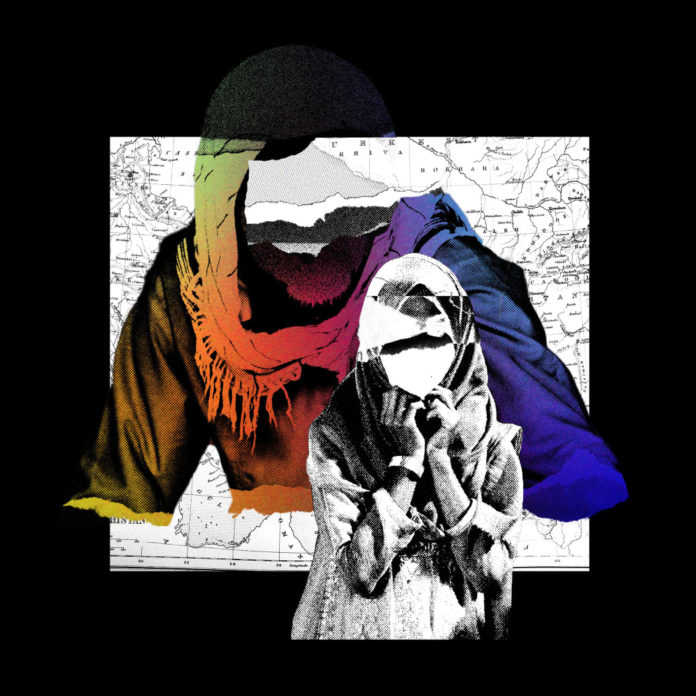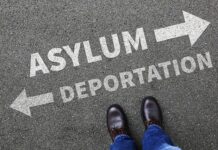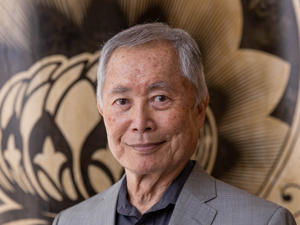It was “so hard” to leave his family in Afghanistan, Talha told The Daily Beast. Then he began crying, recalling the desperate dash to get out of the country, and saying goodbye to his loved ones. “I cried. My family cried. They were happy and also sad.”
Speaking by phone from Canada where he has now been resettled, Talha said, “Having to leave Afghanistan when you are LGBTQ is like having to cut your hands even though you love your hands. You use your hands, you need your hands, but you have to cut your hands. If you don’t, someone else will cut your hands. That’s what it’s like for LGBTQ Afghans right now.”
“My family helped me pack my things,” Talha recalled. “My mum hugged me and told me, ‘Goodbye my son. Leave this country because this country will not be safe.’ She doesn’t know I am LGBTQ but knows the Taliban harass the Hazara people—she, like me, is Hazara. We hugged and said goodbye. I cleaned my phone of everything in case the Taliban stopped me. I sat on the bus thinking, ‘Why is it like this? Why do we have to leave this country? Why are we in this situation?’ There were so many ‘whys’ in my brain. I was also so scared the Taliban would stop the bus and harass and beat me. I hid behind my mask and scarves.”
During his escape, aided by the advocacy group Immigration Equality, Talha reached a friend’s house, stayed there for the night, and then made his way to the airport, terrified again of being captured—and what would happen if the Taliban arrested him. “At that moment you accept the possibility of death, but you want to leave Afghanistan and live.”
Talha is far from alone. Since the Taliban takeover of last August, just over 5,400 queer Afghans have reached out to Rainbow Railroad, an organization that helps LGBTQ people escape state-sponsored violence—“an overwhelming number,” said Dane Bland, the organization’s director of development and communications. The Taliban’s persecution of LGBTQ people is relentless and vicious.
Rainbow Railroad has provided support to 648 queer Afghans to date, including 247 that they have so far successfully evacuated in a refugee-sharing agreement between Canada and the United States; 150 of that number have been resettled, with 50 more soon to do so, said Bland.
Bland said there were another 300 LGBTQ Afghans, who are ready to travel to the West with all necessary documents, certified and vetted, presently in camps—or awaiting resettlement—in countries like the United Arab Emirates, Turkey, Iran, and Pakistan.
Rainbow Railroad says they are ready to work with any Western government to take in these refugees, but the system has become paralyzed with LGBTQ Afghans unable to flee their home country or stuck in refugee camps or in so-called “third countries” unable to move to Western countries. Advocacy organizations like Rainbow Railroad and Immigration Equality want LGBTQ refugees to be defined as a priority population under the P-2 program presently reserved for those Afghans who worked with the United States.
Most queer Afghans have been resettled in Canada, with “only a handful,” said Bland resettled in the United States. Canada had promised to resettle 40,000 Afghans; just over 17,000 have been resettled to date. The Biden administration set a cap of resettling 125,000 refugees in the last year, but only 15,000 refugees have been resettled in the U.S. since last October.
“Even if we go to the moon, Afghanistan is our country. We love our country. Our country is like a mother.”
— Talha
After a period of time in a camp in a neighboring country, Talha made it to Canada. “Emotionally I feel free here. I can be what I am and,” Talha’s voice broke. He began crying again and the line was silent for some minutes before he could speak again. “It was so hard… for us. We left our families, our country, our friends. And now we are safe we can be whatever we want and we can live here without any harassment, without any fear. People accept us. We don’t have any worries, we are not scared. We can be like a bird that’s free, that has its freedom and can fly everywhere it can go.”
Talha misses his home country acutely. “Even if we go to the moon, Afghanistan is our country. We love our country. Our country is like a mother. We miss our families. But we had to leave, and now we are safe, and I am so happy for that.”
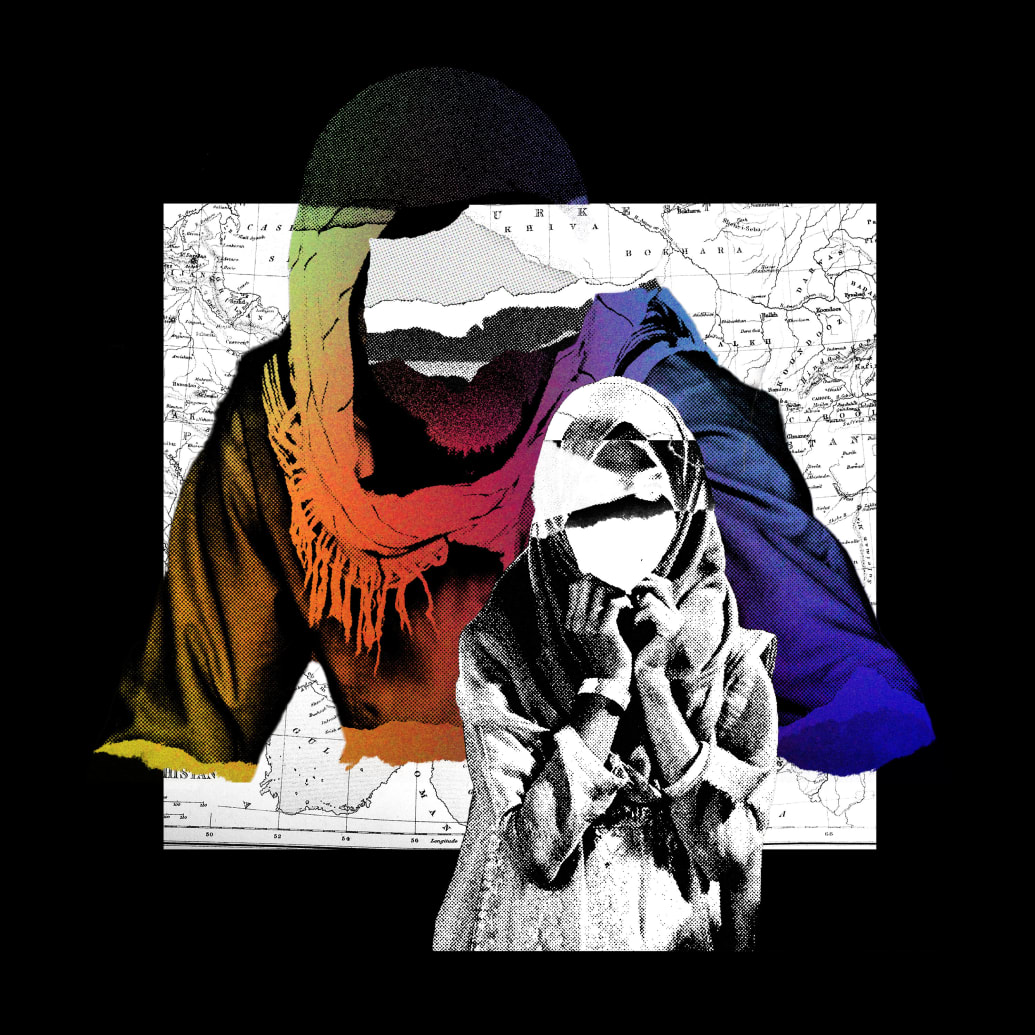
Photo Illustration by Luis G. Rendon/The Daily Beast/Getty
Another gay man, C, who The Daily Beast spoke to last December, finally arrived in Canada this summer—aided by Immigration Equality—after spending 10 months in a refugee camp. “Very happy,” he is presently living in a hotel as he waits for various immigration-related documents to be finalized. He cannot use his real name, he says, because his family is still in Afghanistan, and he worries about both their rejection and what the Taliban would do to them if his identity were known.
At his camp, he didn’t have access to basic needs like food, and there was a lack of resources. “I faced discrimination based on my sexuality. People would not want us LGBTQ near them, and they spoke about us behind our backs. There were 14 other LGBTQ people in the camp, and they were teased a lot too. They remained in their rooms all the time, and would just come out for 10 minutes a day when no one else was outside, so they would not be harassed.”
Ahmad Qais Munhazim, assistant professor of global studies at Thomas Jefferson University in Philadelphia, told The Daily Beast that LGBTQ people in Afghanistan were “engulfed by the hopelessness of a dark present and dark future. They have no idea what is going to happen to them.”
Munhazim, an Afghan-born scholar, queer activist, and political scientist, has aided many LGBTQ Afghan refugees, and is also in regular contact with many queer Afghans still living in the country, as well as those in camps still awaiting onward travel to safe countries.
“Having the bare minimum is not a dignified way to live. Those stories are not sent back to LGBTQ people in Afghanistan who are continuously struggling to get out.”
— Ahmad Qais Munhazim
“The so-called success stories of those who left have resulted in those who remain in Afghanistan feeling not worthy enough,” Munhazim said. “It is also important to note that the narrative that those who have left now have flourishing lives is not true. Some are facing other struggles in their new countries, or facing racism and xenophobia in third countries. Some are on the verge of homelessness in their new countries. They do not have enough money to live. Having the bare minimum is not a dignified way to live. Those stories are not sent back to LGBTQ people in Afghanistan who are continuously struggling to get out.”
Bland said Rainbow Railroad was still in the midst of helping many LGBTQ Afghans who want to flee the country. “Processing delays disproportionately impact LGBTQ refugees, who face serious dangers as they await resettlement,” said Bland. Rainbow Railroad is the lead funder of the largest LGBTQ safe house for those escaping Afghanistan, situated in a neighboring country. Over 150 LGBTQ Afghans have already passed through it.
“We helped set it up because people are not safe in the neighboring countries. We want to support people in a specifically LGBTQ-friendly space,” said Bland. “They are still afraid of going outside the grounds in case they are harassed or pursued by law enforcement—especially for trans and non-binary people facing violence and persecution on the streets.”
Bridget Crawford, legal director of Immigration Equality, told The Daily Beast that the organization heard from LGBTQ people in Afghanistan and neighboring countries “constantly begging for help. People who are in hiding. Reports of people who have been hunted by the Taliban. People who have been outed to the Taliban by a family member. People who are in fear of their lives.
“We have had reports of people being sexually assaulted and raped by Taliban members. The situation is dire. A small number who have been lucky have fought hard and suffered a lot and reached safety in a few countries. Yes, there have been success stories, and we are really grateful for the work of the United States government, the State Department, Canada, and other governments. But it’s simply not enough.”
““His family told him, ‘The Taliban came. They shot him in the head. Now they are after you because they saw pictures of you on his phone, and if they don’t kill you, we will.’”
— Bridget Crawford
Crawford told of one group of LGBTQ Afghans in a refugee camp who were harassed and threatened; one was sexually assaulted in the shower. Another was beaten. “And this was a group on the U.S. government’s radar, supported by us. Imagine how dire the situation is for people who don’t have that level of support.” Like Rainbow Railroad, Immigration Equality is calling on governments to help un-block the process, and work more closely with them to get LGBTQ refugees to safety.
One of Crawford’s Afghan clients from a rural area had a gay relationship with a neighbor, conducted in total secret. Over the years his family became suspicious; he did not marry a woman and seemed “different.” The couple was fearful of a cousin affiliated with the Taliban.
After the fall of Afghanistan last year the client fled to the border to get to Pakistan, and bring his boyfriend there. He called his boyfriend, but couldn’t get hold of him. Then he called his family to ask if they knew anything. “His family told him, ‘The Taliban came. They shot him in the head. Now they are after you because they saw pictures of you on his phone, and if they don’t kill you, we will.’” The man fled to Pakistan where he went into hiding before getting arrested. He was told he would be deported back to Afghanistan if he didn’t get out of the country. Now he is in hiding in Iran.”
“It is heartbreaking. We must bring people to safety”
“For a long time, I didn’t see any sign of hope of one day leaving the camp I was in, so I was very happy when the time came for me to leave that camp for Canada,” C told the Daily Beast. “I hope to finally be able to live in the United States, but I am just happy not to be in Afghanistan, and not in the camp anymore.”
“I don’t know much about my surroundings, so I am being cautious dealing with people,” said C. “Obviously the culture is different. I am focusing on learning English, gradually adjusting to the environment, and moving forward from there.” His partner of many years is still in Afghanistan and has applied for a Special Immigrant Visa to enter America. “I try my best to be with him,” C told The Daily Beast. “I want to be together with him again.”
Taliban members have been harassing C’s partner, who has taken to constantly moving and changing address to evade them. “He is very desperate to leave. He is missing me too. We talk with each other, and we are trying to find a way to be together again. This is my dream. Life is very difficult without him. My message to anyone who has influence or power is this: LGBTQ people in Afghanistan do not have the chance or hope to live as they want to. Please try to help evacuate them from Afghanistan so they can live a free life.”
Jill Kelley, a former honorary ambassador to U.S. Central Command who helped evacuate hundreds—including C—during the chaotic dash to leave the country when the Taliban took control, said it was “so rewarding” to see him safe. Kelley said the U.S. and other governments needed to “make LGBTQ Afghans and other LGBTQ refugees, a priority. People in danger because of their religion, sexual orientation, and gender identity must be prioritized. I think a lot of people do not think about the special dangers LGBTQ refugees are in. We must not forget them.”
“The story of LGBTQ Afghans does not end with his story, and the small number of other success stories. All governments need to do more to help so many more people.”
— Mark Pfeifle
Mark Pfeifle, deputy assistant to the president and deputy national security adviser for strategic communications and global outreach at the White House from 2007 to 2009, also helped in C’s evacuation. Pfeifle said pressure should be continued to be applied to the State Department and governments and non-governmental organizations (NGOs) to make LGBTQ Afghan refugees a priority.
“Stories like C’s should be an enormous, necessary spotlight,” Pfeifle said. “There are untold numbers of people who are still living in extraordinary danger. It is heartbreaking. We must bring people to safety. I am so glad C can have some kind of future, but the story of LGBTQ Afghans does not end with his story and the small number of other success stories. All governments need to do more to help so many more people.”
“The Taliban do not see LGBTQ people as human. If they come to know them, they would stone or kill them.”
— ‘C’
“The LGBTQ people I know in Afghanistan do not have hope to live as a group of people,” C told The Daily Beast. “The Taliban do not see LGBTQ people as human. If they come to know them, they would stone or kill them. LGBTQ people do not feel they can openly express themselves even to each other because the Taliban could be involved. A friend was in contact with someone who asked him to come to his house. When my friend got there, he was sexually assaulted and harassed by 20 guys for two days. He escaped through the bathroom window.”
Bland said “thousands” of LGBTQ people in Afghanistan have told Rainbow Railroad they stay at home or in shelter 24 hours a day to avoid detection. “Every checkpoint on the streets represents the fear that they may be searched and phones examined. They move locations in case they are pursued or tracked by the Taliban.”
Munhazim said queer and trans people, in fear of the Taliban, were cautious in how they presented themselves in public. “But it is important to say that queer people still exist and find ways to get together and live life. Afghans are very resilient. They find underground spaces to get together, and also virtual spaces where they can express themselves, try to survive, and be there for each other.”
Before the Taliban took over, Munhazim told The Daily Beast, queer and trans Afghans had been collectively finding ways to begin to make their presence felt in public, “pushing society to accept them. Now you can’t see that presence in public spaces. Some of their families expect them to get married and start families. Some may be investigated by the Taliban for being feminine or visibly trans. It’s a very complicated situation, and not black-and-white as some western media paints it.”
Some queer teachers, lawyers, and artists Munhazim had spoken to had hoped they might be able to continue their work or education, but the economic crisis gripping Afghanistan had made this impossible, and now they cannot leave. Others have told Munhazim they want to stay, because they could never leave their families. “Afghans are very familial people, and they would feel guilty if they left them. Some are the breadwinners for their families.”
Talha recalled a childhood of playing with girls, relatives being suspicious of this, and within himself a growing consciousness that he was not only different but also not alone in being different, and “that there many people like me.” At school, he was bullied and harassed; at college, he denied the jibes of others that he must be gay, “because I had to hide to be safe.”
Eventually, Talha found a straight bar in the city he lived in which welcomed a queer clientele. “I was a good dancer and loved dancing.” But some people took video of him dancing, posting it on social media, which again made him scared in case it was seen and he was targeted. He endured more harassment by gangsters and thugs, who would beat him and his friends up when they refused to go with the men or give them their numbers. “One of my friends was kidnapped by gangsters who gang-raped and beat him. We were always very scared of people. The government did not accept us. Being LGBTQ was illegal.”
“I have lost so many friends. One was arrested, beaten, and raped by the Taliban. You walk the streets and worry they will see who you are, pick you up, check your cellphone, maybe arrest you.”
— Talha
When the Taliban took over, they closed the bar and took its cameras and video footage away. “So, they knew about us,” Talha said. “I deleted Facebook and Instagram. I changed my number. I left the city and went to my home city. I am not only LGBTQ but Hazara, who the Taliban punish and target. I was scared to go out. When I did, I wore masks and scarves to hide myself.”
Talha says he has “passed so many difficulties, so many dangers, I have lost so many friends. One was arrested, beaten, and raped by the Taliban. You walk the streets and worry they will see who you are, pick you up, check your cellphone, maybe arrest you. I saw so many explosions, so much violence, people beaten in front of my eyes.”
He tried to get on one of the flights out of Afghanistan last summer. “I slept in front of the airport. I thought if I have a 0.1 percent chance of getting out, I had to try. I had to escape from there. After the Taliban came it was not a place for LGBTQ people. If they know you are LGBTQ they will arrest you and kill you in front of people. My friends are in bad situations. One is depressed, he doesn’t go outside. Most LGBTQ people stay home nowadays. They feel someone could knock on the door and arrest them. One person I know was arrested in front of his family.”
One client told Crawford the story of a gay couple in his town whose leaders discovered the men were gay and in a relationship and decided they deserved to die. “One man fled, never to be heard from again. The other had his hands tied, he was thrown into a river and drowned.”
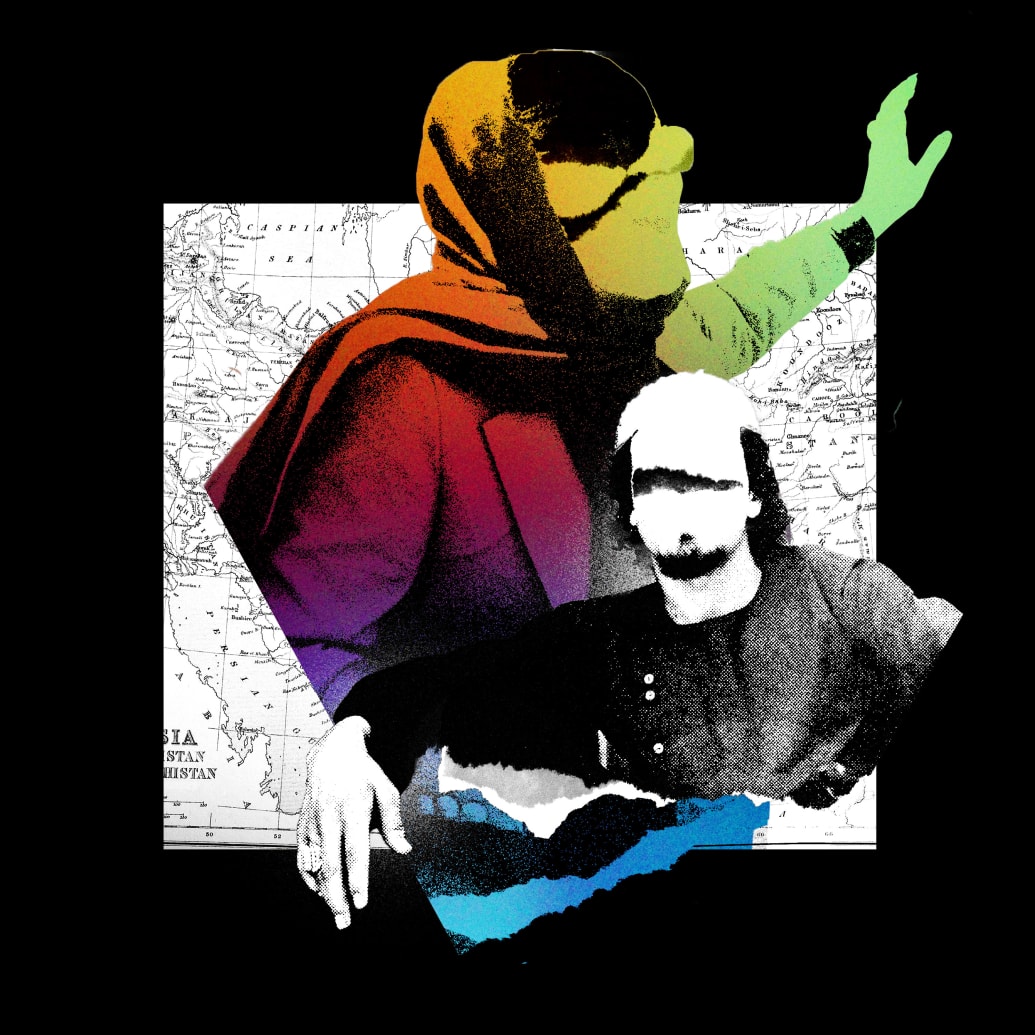
Photo Illustration by Luis G. Rendon/The Daily Beast/Getty
“They feel the world has betrayed them”
Over 60 percent of queer Afghans who have contacted Rainbow Railroad “lack basic necessities, funds and resources for life, food shelter, and clothing,” said Bland. “We hear from people who have been cut off from families, or forced from homes, who have suffered violence and beatings, or who have had their identity documents confiscated including passports to prevent them from escaping the country.”
Rainbow Railroad’s ability to help get LGBTQ Afghans out of the country is being hampered by the refugee and immigration system grinding to an effective halt, and the few opportunities to ensure the passage of refugees to safe countries.
“Our hands are genuinely tied,” said Bland. “We provide financial aid and shelter as much as we are able, but these are patchwork solutions to what is really needed—a coordinated effort by governments and civil society organizations to move the wheels in a meaningful way again, and expedite the processing of LGBTQ refugees safely and quickly. Many LGBTQ Afghans are in dire, desperate situations. Governments must recognize this. We know who needs help, we have the lists. Help us get these people to safety.”
“International communities and some human rights activists think that by helping a few queer and trans refugees they have solved the problem. They haven’t.”
— Ahmad Qais Munhazim
Much help for queer Afghans “abruptly stopped” when the media focus shifted from Afghanistan, and “the Ukrainian crisis took over everything,” said Munhazim. “That has already impacted the mental health of queer and trans people in Afghanistan and the way they see the future and what is going to happen to them. They feel the world has betrayed them.
“International communities and some human rights activists think that by helping a few queer and trans refugees they have solved the problem. They haven’t, just like they didn’t solve it when they were in Afghanistan the previous 20 years. They didn’t bring about any kind of change. The only clinic for trans people was run by Afghans themselves. Now it is closed.”
Talha wants Western political leaders and those with power “for one moment to imagine they are LGBTQ in Afghanistan. You don’t have any rights. It is also your home. There is a high risk of danger. What do you do? I want them to imagine being in this position, and in doing so realize they must help LGBTQ Afghans. They are human. You are human. All humans must be equal. Don’t be quiet. Imagine what it is to be LGBTQ there. If you have any power to do so, help these people.”
Presently, the refugee system’s paralysis is all-encompassing. “Where can queer Afghans go to?” said Munhazim. “I have spoken to some people in Pakistan in a very difficult situation. Their visas and passports are expiring. They are stuck. The system is blocked. It’s like other countries are saying, ‘We’re done. We took the ones we wanted to. That was very humanitarian of us. That’s over now.’
“They should really be thinking of how to support the Afghans still in Afghanistan who may eventually help build a new country. One possible way forward is to employ those queer Afghan refugees who have gotten out, and who are activists, to find ways to help queer Afghans still in the country. They know what they need, and how to get it to them.”
Munhazim said to solve the blockage affecting the safe, onward passage of queer Afghan refugees, Western countries “need to do what they did with Ukrainians, and open borders, and welcome everyone who needs to be somewhere else.”
Munhazim said Islamophobia and racism underpinned why Afghan refugees were being treated differently. He had spoken to queer Afghan refugees in Germany who are watched as if they were potential thieves when they go to the supermarket and who, when they sit down on a bus, note that people move away from them. “Countries need to change people’s perceptions of refugees, particularly Muslim refugees. And give them proper housing. You cannot expect a family living in a hotel room for a year to be mentally and emotionally stable. Trans refugees are having a particularly hard time accessing hormones.”
“When he got out of the trunk of the car to go to the bathroom, the trafficker tried to rape him.”
— Bridget Crawford
Crawford recalled one Immigration Equality client trying to escape to Pakistan, not being able to get a visa, then paying a trafficker to transport him in the trunk of his car across the border. “When he got out of the trunk of the car to go to the bathroom, the trafficker tried to rape him. The client ran off and hid under a car. He was waiting in Pakistan to have his application to get to Canada processed when the police picked him up, and he was deported back to Afghanistan. Now we’re desperately trying to get him out of Afghanistan,” Crawford said. “He does have a pathway forward.”
Another gay Afghan client told Crawford about his boyfriend, who had left the house to buy food and got picked up and raped by a group of men. Crawford had heard many reports of Bacha bāzī—the rape and sexual abuse of young boys by older men. “It happened to many clients who were forced to take part in various practices under threat of death. Some of our other clients are terrified of persecution by families, and some are afraid for their families because they fear their families will be targeted if it is discovered they have a trans or LGBTQ child.
“Some of our clients are bisexual or gay, and were forced into arranged marriages to try and fit in. Some have children and wives, who while they may not have romantic feelings for, are still loyal to as their families.”
“Some queer and trans refugees would love to be evacuated with their families. They really suffer by not being with them. Give them that option.”
— Ahmad Qais Munhazim
Munhazim said that the narrative of all families of queer children being homophobic and transphobic was “an Orientalist assumption and not the reality. Afghans have a very queer cultural history, and families have welcomed queer and trans children in many ways. The presence of the Taliban has made those families more vigilant and cautious, and seeking to exert control over the gender and sexuality of their kids.”
Munhazim said some queer and trans people being evacuated from the country would have loved to have brought their families with them, but were not able to. “The western idea” was to ask if they had a partner to evacuate with, but Munhazim said this should be expanded to include family members (if those queer and trans people would like to be with them), especially as those family members “find themselves in danger after their queer family members have left the country. Also, some queer and trans refugees would love to be evacuated with their families. They really suffer by not being with them. Give them that option.”
Dane Bland of Rainbow Railroad was moved recently to see some refugees attend an LGBTQ event in Canada, “who realized suddenly their LGBTQ identities were not just protected but celebrated.
“However, refugees are not treated fantastically in safer countries,” said Bland. “There is xenophobia. There is not much political capital used in welcoming them. It is incumbent on all of us in Canada and America to be more vocally supportive of newcomers and refugees getting to safety here, so politicians recognize it not as a necessary tick in a box of obligation, but doing what is right for the most amount for people as humanly possible.”
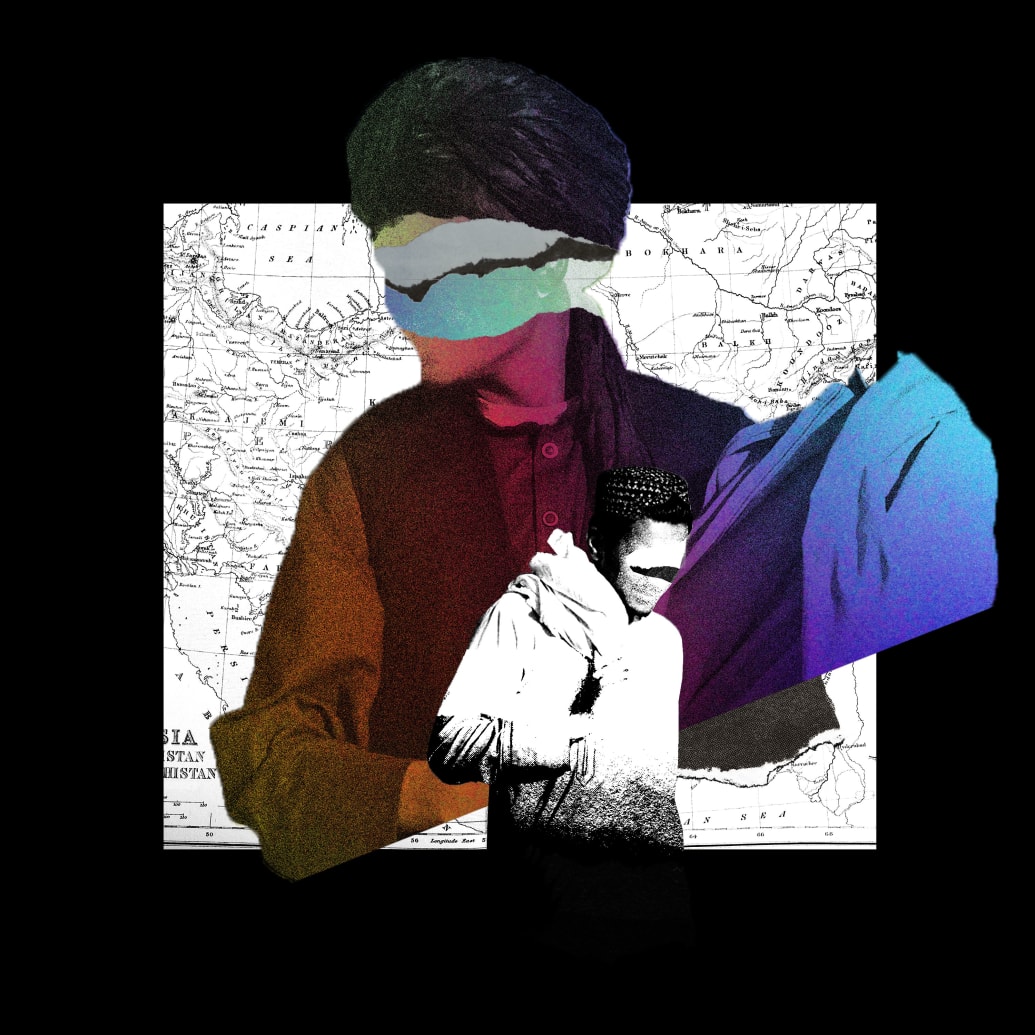
Photo Illustration by Luis G. Rendon/The Daily Beast/Getty
“Conveying hope is important—but it’s not enough”
For Crawford, the question for the Biden administration and State Department is clear and blunt: “Why can’t we resettle more queer and trans Afghans here? Some have been, but not in large numbers. They have so much to contribute. We must help them.”
No representative from the U.S. State Department was available for interview. In a statement addressing a number of issues raised in this report, a State Department spokesperson told The Daily Beast said the department was still dedicated to protecting vulnerable populations, and recognized “the unique challenges and threats members of the LGBTQI+ community face within Afghanistan. The United States has consulted with Afghan civil society organizations, and LGBTQI+ Afghans, international NGOs, and human rights defenders for many years to address these vulnerabilities. The United States continues to advocate for respect for the human rights of all Afghans, including for members of the LGBTQI+ community.”
The statement said the State Department continued “to identify ways to support Afghans at risk, including women, children, persons with disabilities, members of the LGBTQI+ community, members of minority groups, and journalists. This effort is of the utmost importance to the U.S. government.”
“We call on the Taliban to allow freedom of movement for all Afghans, and strongly encourage Afghanistan’s neighbors and other countries to allow entry for Afghans seeking protection.”
— State Department spokesperson
The State Department recognized how hard it was for many to leave Afghanistan, and with other agencies continued “to discuss and troubleshoot issues that arise with groups and individual cases throughout the process of relocation. We are exploring opportunities for increased access to the U.S. Refugee Admissions Process (USRAP) for LGBTQI+ persons to ensure that LGBTQI+ refugees around the world have access to resettlement as a durable solution.”
In the now-urgent present, with many pathways to safety currently closed or blocked, NGOs and civil society organizations are scrambling to do what they can to help refugees in immediate need. Activists insist the system needs a massive, immediate overhaul to help refugees most in need.
“We always try to convey a message of hope and solidarity,” said Crawford of Immigration Equality. “Years ago, I had a client who had been rejected by his family. They had discovered him being intimate with someone when he was 13. His father first tried to drown him. Then his family stopped speaking with him and made him eat with the dogs. He ran away, and preparing his application to get to Canada, asked, ‘When I get to Canada, can they find me a family?’ It was just gut-wrenching.”
Crawford told the man about organizations like PFLAG, and how there were people and allies in America and Canada who supported and celebrated LGBTQ people. “It was a heartbreaking conversation. At the same time, it gave him a lot of hope that there were people out there who cared and were in solidarity with him. Conveying hope is important—but it’s not enough.”
“I hope the Taliban breaks apart, and new people come to govern the country. One day I would like to be in my own country again.”
— Talha
C is looking forward to exploring the LGBTQ scene in the Canadian city he is now living in, but feels he cannot fully express himself as he still lives around other homophobic Afghans. A woman he knows, who helped him enroll in an English course, has also given him information about a forthcoming LGBTQ event he hopes to attend. He wants to continue his education.
Talha has been to his first gay bars, amazed at seeing people able to wear what they want. “I compare this to my own country. Why is there a difference in Afghanistan? Why can’t we as LGBTQ people be accepted like here? I did not cry, but it was an emotional moment to see this, and think about this.”
Talha hopes he can build a career in hairdressing and beauty, then with his income help support his LGBTQ friends in Afghanistan. “I hope my own country one day gets better,” Talha told The Daily Beast. “I hope the people accept LGBTQ people. I hope the Taliban breaks apart, and new people come to govern the country. One day I would like to be in my own country again. After hundreds of years, what a good feeling that would be.”

